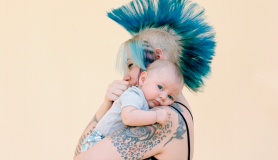Most children become harder to manage at around fourteen months. That’s because they make a huge developmental leap at this point. They’re not so easily distracted. They realize they have some influence in the world, but not a lot of power, and they start experimenting to see how they can get their needs met and their desires fulfilled.
This can be a maddening time for parents, or it can be a wonderful time, watching your child blossom. How difficult the phase from 15 to 36 months is depends at least partly on the parent’s attitude. Your child’s rebellion will be inversely proportional to the freedom your toddler is given to do his developmental work, and how capable he feels to get what he wants in the world.
1. LET YOUR CHILD BE IN CHARGE OF POTTY TRAINING - Remember, this is a gradual learning process for your child. They all get out of nappies sooner or later. Toilet training can actually be empowering for your child, an important step in independence, but that depends on how you handle it. If your child shows zero interest in toilet training, find opportunities for him to be around other kids who are using the toilet, and he’ll quickly want to emulate them.
2. SIDESTEP POWER STRUGGLES - You don’t have to prove you’re right. Your child is trying to assert that he is a real person, with some real power in the world. That’s totally appropriate. Let him say no whenever you can do so without compromise to safety, health, or other peoples’ rights. You’ll be glad to know that since tantrums are an expression of powerlessness, toddlers who feel some control over their lives have many fewer tantrums.
3. PRE-EMPT TANTRUMS - First, know that tantrums are normal for kids this age. Second, since most tantrums happen when kids are hungry, tired, or feel disconnected, think ahead. Preemptive feeding and napping, firm bedtimes, re-connection with you, cosy times, peaceful quiet time without media stimulation - whatever it takes to calm down and rest - prevent most tantrums, and reground kids who are getting whiny. (Whining is your child’s signal that his internal resources are not up to the demands of that moment and he needs your help.)
4. USE PLAY - Toddlers don’t like to be ordered around any more than you do. What they do love is to play. Want cooperation? Fly your toddler up to her bath. Get him to finish his milk by pretending to be a puppy who loves milk. Get her into her car seat by pretending to be the flight attendant preparing for takeoff. Race him to the car.
5. DON’T FORCE HER TO SHARE - That actually delays the development of sharing skills! Kids need to feel secure in their ownership before they can share. Instead, introduce the concept of taking turns. (“It’s Aisha’s turn to use the bucket. Then it will be your turn.”) Help him wait for his turn with empathy. Help him put his favourite toys away before another child visits. When he does share, out of the goodness of his own heart, empower him to make that choice again by observing, aloud, the effect of his choice: “Look how happy Kevin is that he gets a turn with your truck.”
6. BE THE PERSON YOU WANT YOUR CHILD TO BE - Children learn to interact with others by experiencing relationships with their parents and siblings, and then they recreate what they’ve experienced. Remember that your toddler is learning both sides of any relationship she’s in. If you don’t want her to tantrum, don’t lose your temper at her, which models tantrumming.
7. ELIMINATE VISUAL ELECTRONIC MEDIA - The American Academy of Pediatrics recommends that children under the age of two not watch TV or videos at all because they have other important developmental work to do and because it impacts brain development. The AAP recommends that older children watch AT MOST an hour or two per day of nonviolent, educational TV. I recommend TV and movies only for special occasions. It starts an addiction in kids who are prone to it.
8. FEEDING IS THE TODDLER’S JOB - Never fight over food. You provide the healthy food. She feeds it to herself. (Yes, even when she’s tiny. Just put a mat under the high chair.) Don’t obsess about how much your child eats. Kids don’t starve themselves. Many toddlers are too busy during the day to eat enough and therefore ask for food at bedtime. If you make sure the snack is healthy, you take the pressure off dinner. You can combine it with the bedtime story if you’re short on time
9. USE ROUTINES - Kids self-regulate more easily when they live in a safe, predictable structured routine where they know what to expect.
10. GIVE HER THE OPPORTUNITY TO EXPERIENCE COMPETENCE
Toddlers tantrum less and cooperate more when they feel more powerful. How can you help your toddler feel more powerful? Three key ways:
- Listen to her
- Let her make decisions whenever possible
- Give her the opportunity to experience competence
Toddlers need daily experience with work to gain confidence in their own capabilities and begin to think of themselves as competent people. Toddlers LOVE to understand how the household functions, and to participate. They LOVE to feel valuable by contributing to the household. They LOVE to learn by doing. This was one of Maria Montessori’s most important insights.
Toddlers can:
- Make themselves a snack, such as peeling fruit or an egg, or slicing soft cheese and making sandwiches with crackers.
- Help wash pots and pans or other unbreakable dishes.
- Wash vegetables.
- Wipe the counter.
- Help you clean the fridge.
- Help set and clear the table.
- Scrub the tub (from inside, barefoot!)
- Pair the socks as you fold clothes.
- Help you hang clothes on a line.
- Wash the table or floor.
Sure, it’s more work than just doing it yourself. That’s not the point. You’re helping your toddler feel competent and powerful, so they don’t need to assert their power by being contrary. They’re more confident. They’re better at problem-solving. They develop more executive function, earlier. And they’re more helpful, now and in the future! That’s what I call win-win.
Dr. Laura Markham, founder of AhaParenting.com and author of Peaceful Parent, Happy Kids, Peaceful Parent, Happy Siblings and her latest book, the Peaceful Parent, Happy Kids Workbook.







